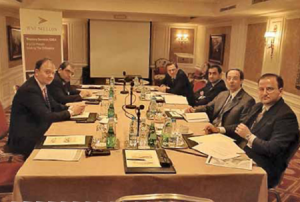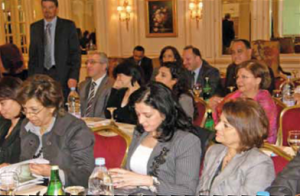Philippe Arbadji, BNY Mellon’s vice president for treasury services, Levant region, and Dominic Broom , managing director, treasury services EMEA, recently hosted a roundtable featuring a number of senior trade and transaction banking professionals from across Lebanon and Jordan. In light of the views expressed, they discuss the future of the sector.
While many banks in the West are seemingly re-discovering the value of “back-to-basics” banking following the credit crunch, this has long been the Levant’s method of choice, and it has served the region well.
Certainly, the region’s long-standing focus on core banking principles has allowed it to come through the global credit crisis relatively unscathed. As a result, tradition is not going to be abandoned any time soon.
It would be simplistic, however, to say that there is no place for the modern, especially where transaction banking is concerned. Transaction banking in the region today is a combination of a staunch belief in, and adherence to, conventional banking methods, and a desire for the new electronic cash and supply-chain models, with tradition playing a dominant role.
“Traditional is not a bad word,” said Abdul Salam Chebaro, central manager and head of trade finance at Bank Audi, when speaking at the roundtable event. “Sustained income can only be made using traditional methods. Banks, no matter how sophisticated their business, earn only three types of income: fee-based income for services rendered, commission-based income and interest-based income, which has to do with risk.”
This same principle also extends to client relationships. After all, if transaction banking can be defined as providing working capital solutions to end-user customers, whose requirements can differ substantially from one country or region to another, it is the needs of the local market that should dictate what the ultimate solution should be. The Levant’s trade financiers recognise this and the idea is rapidly gaining in momentum throughout the Middle East.
“You have to know your clients,” said Maurice Iskander, head of the international division at Banque Libano-Française. “You have to know what your clients are doing and what they need in order to do it. This is basic banking.”
Certainly, local customer knowledge and market proximity are crucial in today’s postcrisis landscape. Now, therefore, is the time to move from a profit or product-driven perspective to a “service the customer” standpoint, and the banks that are now getting ahead are those taking that view.
Indeed, Mohamad Shahin, chief executive officer of Jordan-based IMDAD (a newly incorporated subsidiary of Investbank), captured this sentiment when describing his company’s business model to the roundtable:
“The model we tried to set up at IMDAD is designed so that the customer has only one connection [with the bank]. This is what is important.”
Working together
While a staunch faith in conventional banking has stood the region in good stead, and the value of a client-focused approach is increasingly recognised, is this enough to overcome the hurdles banks now face? Times are tough globally and the Levant, despite its relative strength and stability, cannot remain unaffected by the rising cost of liquidity and compliance concerns that can curb business.
A further weapon in the local banks’ armoury has been the region-wide recognition of the importance of well-selected strategic alliances between financial institutions – especially those based outside the Levant. Many financial service providers, including transaction bankers, have adapted their approach to business accordingly.
“The Lebanese banks know the value of having synergies with these – let’s call them clearing house banks – in the West,” said Bank Audi’s Chebaro. “Relationships with these major banking institutions are crucial for banks like us.”
Ibrahim Bisha, executive manager, treasury and investment department, Jordan Kuwait Bank in Amman, shared this view.
“The global situation is now very challenging,” he said. “As a result, we are keen to maintain strong relationships with our main correspondents.”
Continuing on this theme, the region’s bankers acknowledge that, going forward, inter-financial institution relationships will grow in value to correspond with both the evolution of local trade and the emergence of new payment channels that are increasing the region’s competitive dynamic.
“Electronic banking is going worldwide and this, combined with the increase in mobile banking and emerging solutions such as digital dollars, is where banks could end up losing out,” said Bisha. “Banks need to invest more in IT and maintain their client relationships. This is the future.”
Certainly, if the regional banks are to remain competitive, they need to address these issues. While their proximity to the local market and longstanding relationships with the local corporates help with the latter, the need for technological investment is not so easily solved.
In the current climate, proprietary IT investment is not a viable option for the majority of local banks. As in other markets, transaction banking is considered to deliver a limited return on investment and the increased time-to-market associated with in-house development is a concern.
The seemingly obvious alternative would be outsourcing, but this would be only half the battle won. While outsourcing has the potential to give local banks access to the platforms they need, it does little else to work in their favour. Most outsourcing offerings provide precious little flexibility for local banks to offer their clients bespoke solutions. This both renders them incapable of competing with the international banks operating on their home turf and lends itself to a product-driven, rather than the desired solutions-driven, approach. In addition, the competitor risks that are inherent with the outsourcing model are too great. Regardless of the contractual agreement between the local and insourcing bank, there is always danger that giving a larger rival institution access to privileged client information could result in the eventual loss of the client to the bigger bank.
A potentially preferable alternative is a localglobal bank collaboration model, which allows the local bank manager to leverage the processing capabilities of a specialist global provider to suit the specific needs of the local market in question. This is a fresh take on the conventional outsourcing model and builds on the themes of client-focus and inter-bank relationships, which are prevalent throughout the region.
At BNY Mellon, this model is referred to as the “manufacturer-distributor” model and it is predicated on the concept of banks being either “manufacturers” of transaction banking products and solutions or “distributors” of these services to regional markets in accordance with the needs of the local client bases.
The strength of this approach is its emphasis on local market needs. Once engaged, local banks can offer clients bespoke cash management and trade finance solutions while retaining core competencies and generating cost efficiencies. As a result, local banks can make transaction banking a sustainable and valued line of business without compromising on principles or losing sight of the region’s age-old roots in international commerce.
The views expressed herein are those of the authors only and may not reflect the views of BNY Mellon.
 Cash And Trade Magazine For Cash and Trade professionals in the Middle East
Cash And Trade Magazine For Cash and Trade professionals in the Middle East





